Not all cloud storage services are created equal when it comes to keeping your documents and files secure online. That’s where Dropbox, pCloud, and Sync.com come into play. In this cloud storage comparison, I explore the security features of these three leading cloud storage services.
Did you know that:
Dropbox (500M+ users) has had several security breaches in the past, including a 2012 breach that exposed over 68 million user passwords and a cyber attack in 2022 where source code repositories, as well as names and emails of their employees. pCloud (10M+ users) and Sync.com (1M+ users) have not had any reported security breaches.
| Feature | Dropbox | 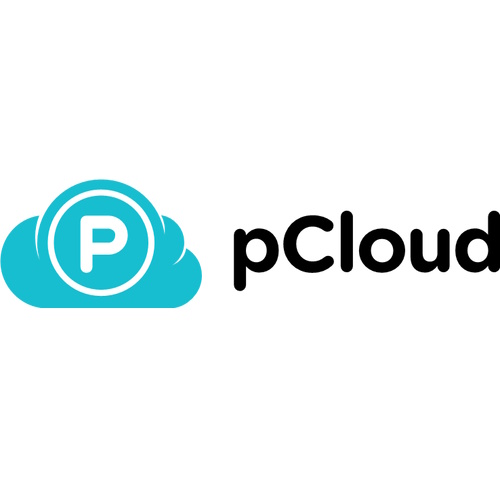 pCloud |  Sync.com |
|---|---|---|---|
| End-to-End Encryption | No 🔓 | Yes 🔒 | Yes 🔒 |
| Two-Factor Authentication | Yes 🔒 | Yes 🔒 | Yes 🔒 |
| Zero-Knowledge Privacy | No 🔓 | Yes 🔒 | Yes 🔒 |
| Secure File Sharing | Yes 🔒 | Yes 🔒 | Yes 🔒 |
| Backup & Recovery | Yes 🔒 | Yes 🔒 | Yes 🔒 |
| Industry Standards & Regulations | Yes 🔒 | Yes 🔒 | Yes 🔒 |
What is Cloud Storage Security, and Why It’s Something You Need?
Think of cloud storage as a treasure chest. Inside, you store your precious digital jewels: documents, photos, videos, and more. But what happens if your chest is left unlocked? Enter cloud storage security.
What is cloud storage security? Think of it like it’s the lock on your treasure chest. It’s a mix of technologies, policies, and controls that work together to protect your digital valuables from threats like hackers and malware. Cloud storage security ensures that your data isn’t just floating around in cyberspace, ripe for the picking. Instead, it’s stored securely, accessible only to those with the right keys.
Why is cloud storage security essential? Simple. We live in an age where digital data is as valuable, if not more so, than physical property. Think about it. Your financial details, personal documents, even memories in the form of photos and videos, all in digital form. A security breach could mean losing it all. That’s why you need cloud storage security – it’s your digital lock and key.
Let’s dive deeper into how Dropbox, Sync.com, and pCloud tackle cloud storage security.
1. End-to-End Encryption: Which Service Does It Best?
When it comes to end-to-end encryption, all three players – Dropbox, pCloud, and Sync.com – have staked their claim. But the real question is, who does it best? Let’s take a close look at each one.
Dropbox
Dropbox, a stalwart in the cloud storage arena, uses 256-bit AES for files at rest and SSL/TLS for data in transit. However, end-to-end encryption is a different ball game. Dropbox doesn’t offer end-to-end encryption natively. Business users can leverage it, but only via third-party integrations.
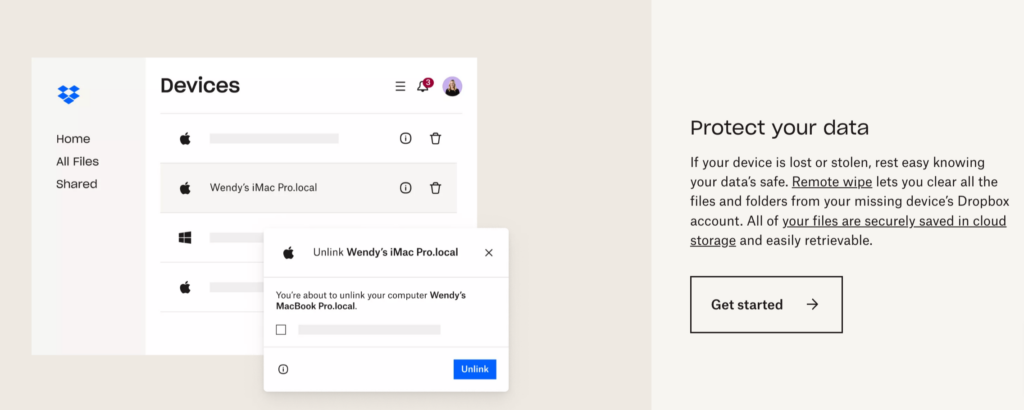
Without third-party integrations, your files could be accessed by Dropbox under certain circumstances, such as due to a court order. However, with third-party integrations like Sookasa and Boxcryptor, Dropbox business users can achieve end-to-end encryption, enhancing the security of their stored files.
Still, it’s an extra step and added cost that isn’t required with some other cloud storage providers. This is, in my opinion, Dropbox’s most serious security flaw! Here’s my guide on how to make Dropbox more secure.
pCloud
Unlike Dropbox, pCloud steps up the game, offering end-to-end encryption with its pCloud Crypto service. However, it’s worth noting this feature comes at an extra cost. Yet, the peace of mind knowing your files are only readable by you might justify the price.
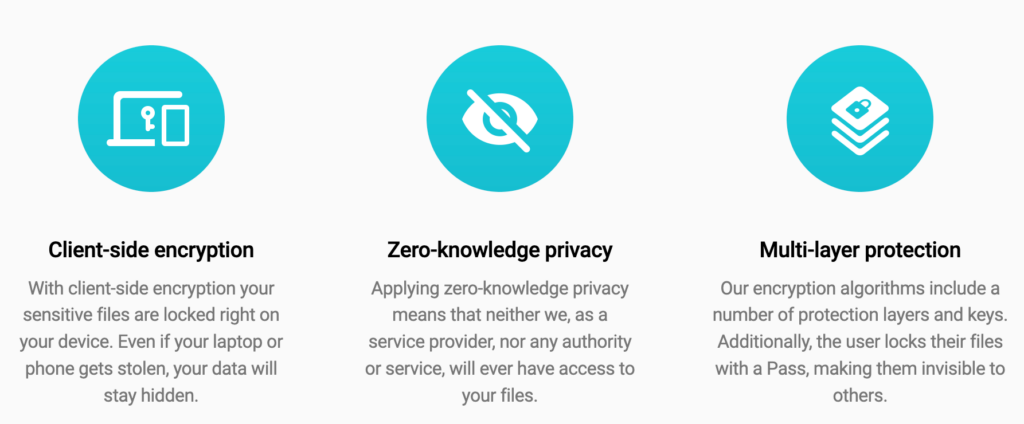
The pCloud Crypto service works by encrypting your files on your device before they are uploaded to the cloud. This means that even if someone were able to access your cloud storage without permission, they would not be able to read or alter your files due to the encryption.
pCloud neither stores nor has access to your encryption keys, which adds an extra layer of security. It’s also important to note that this encryption method applies to all types of files, providing comprehensive security for your stored data.
Sync.com
When it comes to preserving your digital valuables, Sync.com takes a no-compromise approach. They secure your peace of mind with their ironclad end-to-end encryption.
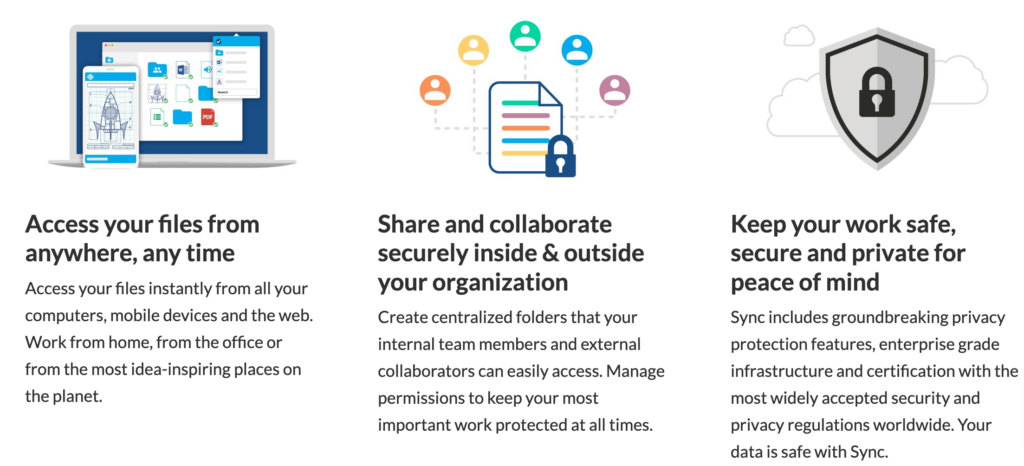
So what’s the deal with end-to-end encryption? This means that your data is encrypted (i.e., scrambled into unreadable bits) from the moment it leaves your device, remains encrypted while in transit, and stays encrypted on Sync’s servers.
Even if someone intercepts your data during transfer, all they would see is gibberish. This feature applies not just to your files but also to your file metadata, enhancing your overall data security.
Sync.com is the clear winner on the end-to-end encryption front. They offer this security feature as standard at no extra cost. All data, whether at rest or in transit, is securely encrypted, making Sync.com an excellent choice for privacy-focused users.
So, in the end-to-end encryption showdown, Sync.com takes the trophy. But remember, each service has its own strengths and weaknesses, and the best choice will ultimately depend on your specific needs.
2. Two-Factor Authentication: Which Service Does It Best?
Two-Factor Authentication (2FA) is like the bouncer at your favorite club, adding an extra layer of security to your personal digital rendezvous. So which of our cloud storage contenders – Dropbox, pCloud, or Sync.com – packs the most punch when it comes to 2FA?
Dropbox
Dropbox, being the veteran in the game, offers 2FA through both SMS and mobile apps like Google Authenticator. It’s like having an experienced doorman who knows all the tricks in the book.
pCloud
Over to pCloud. Although Johnny-come-lately, it takes 2FA seriously. It supports Google Authenticator, but ditch the SMS route. It’s akin to a more sophisticated security system: less hands-on, but equally efficient.
Sync.com
Lastly, let’s talk Sync.com. This service puts a high premium on security, offering 2FA via Google Authenticator and Authy. Sync.com is like that new, state-of-the-art security system that leaves no stone unturned.
In conclusion, all three providers make the cut in the 2FA department. Your choice depends on your preference – a seasoned veteran, a sleek newbie, or a security-obsessed upstart. You’re in good hands regardless.
3. Zero-Knowledge Privacy: Which Service Does It Best?
Ever feel like you’re being watched? With zero-knowledge privacy, that’s not an issue. Let’s see how our three contenders stack up in this arena.
Dropbox
Dropbox, unfortunately, doesn’t offer zero-knowledge encryption. This means Dropbox has the keys to decrypt your files if necessary. While they promise not to access your data without your consent, it’s a potential privacy concern.
pCloud and Sync.com
On the other hand, pCloud and Sync.com do provide zero-knowledge encryption.
With pCloud, it’s part of their optional Crypto plan. Sync.com, however, includes it as a standard feature. With both services, even they can’t access your files without your password.
So, for zero-knowledge privacy, Sync.com takes the crown. This is because they offer this feature at no additional cost, unlike pCloud. If privacy is your top priority, Sync.com is a solid choice.
It’s important to note that zero-knowledge encryption can make certain features, like file previews and sharing, more challenging. But, for the privacy-conscious, it’s a worthy trade-off.
4. Secure File Sharing: Which Service Does it Best?
When it comes to secure file sharing, all three services – Dropbox, pCloud, and Sync.com – have their unique strengths. However, the devil is in the details.
Dropbox
Dropbox, the seasoned player in the field, offers password protection and expiration dates for shared links. But that’s not all. Its robust ‘team’ settings allow the admin to manage access levels, making it a favorite among business users.
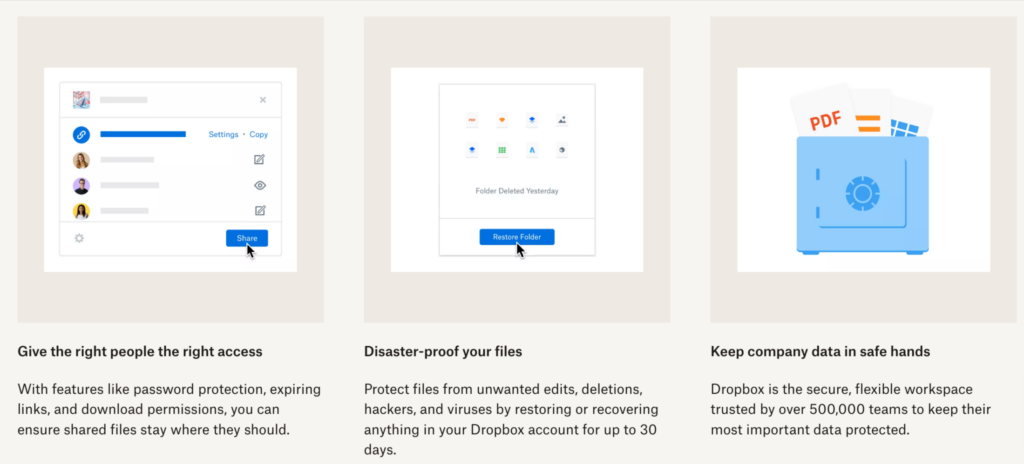
pCloud
pCloud, on the other hand, takes a more user-centric approach with its pCloud transfer. With its unique ‘upload link’ feature, you can allow others to upload files to your cloud. And, of course, it also offers password protection and expiration for shared files.
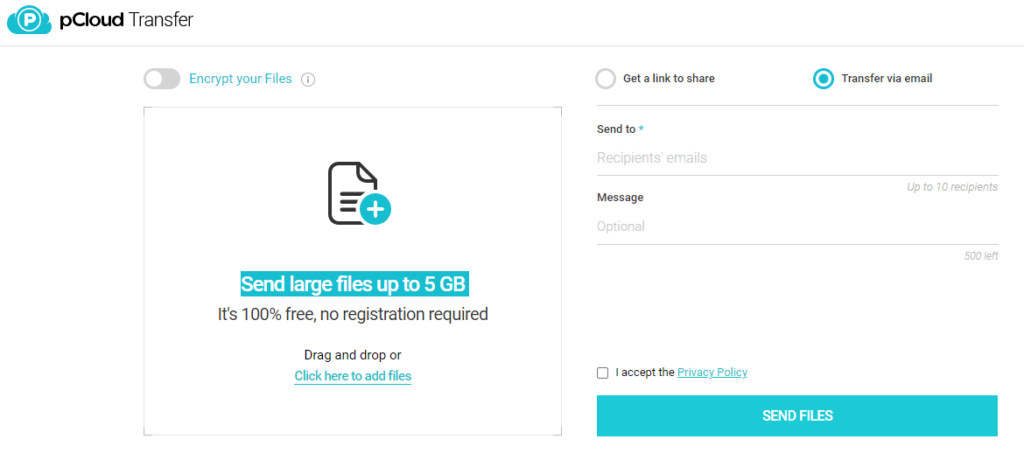
Sync.com
Sync.com may be the winner here. It provides password-protected links and expiration dates and boasts zero-knowledge encryption. This means even Sync.com can’t access your files – the ultimate privacy level!
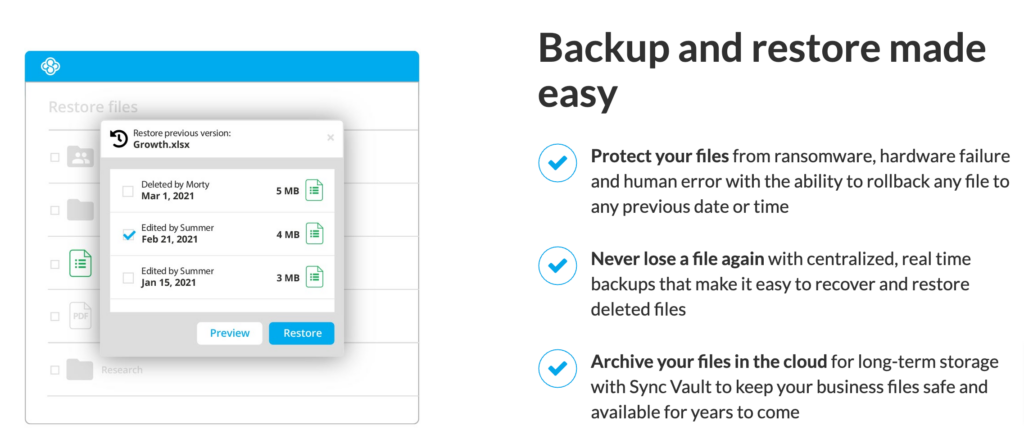
So, there’s no one-size-fits-all answer here. Choose the one that best fits your needs and sleep soundly knowing your files are safe in the cloud!
5. Backup and Recovery: Which Service Does it Best?
When it comes to your precious digital files, losing them is not an option. The safety net? A reliable backup and recovery system. In this section, we’ll dive into Backup and Recovery, analyzing which cloud storage service – Dropbox, Sync.com vs pCloud, handles this crucial aspect best.
Dropbox
Dropbox offers a backup and disaster recovery option called ‘Rewind‘. This feature allows users to restore their files to a previous version or date within the last 30 days.
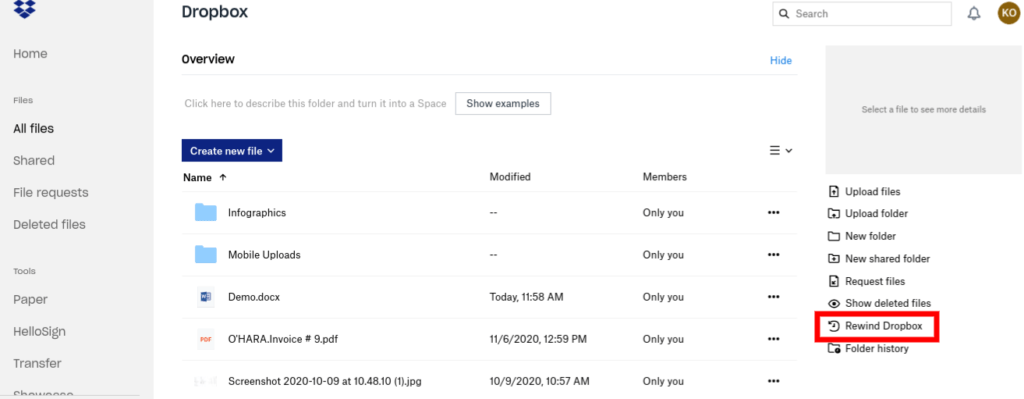
Dropbox also has a version history feature that allows users to view and restore previous versions of their files. Additionally, Dropbox offers two-factor authentication and encryption at rest and in transit to ensure the security of user data.
pCloud
pCloud offers a backup and disaster recovery option called ‘Rewind‘. This feature allows users to restore their files to a previous version or date within the last 30 days. pCloud also offers a trash bin feature that allows users to recover deleted files for up to 15 days.
Additionally, pCloud offers client-side encryption and two-factor authentication to ensure the security of user data. In case of a disaster, pCloud has a redundant infrastructure that ensures data is replicated across multiple servers and locations for added protection.
Sync.com
Sync.com offers a backup and disaster recovery option called ‘Vault‘. This feature allows users to recover deleted files and previous versions of files for up to 180 days.

Sync.com also offers end-to-end encryption and two-factor authentication to ensure the security of user data. In case of a disaster, Sync.com has a geo-redundant infrastructure that ensures data is replicated across multiple locations for added protection.
Sync.com reigns supreme when it comes to backup and recovery options in the sphere of cloud storage. Their standout feature, ‘Vault‘, provides users with an impressive six-month window to recover deleted or older versions of files. In addition, the peace of mind offered through end-to-end encryption and two-factor authentication is incomparable.
Also, their geo-redundant infrastructure, ensuring data replication across multiple locations, adds an extra layer of disaster protection. All these security features combined make Sync.com a truly robust and reliable choice for cloud storage.
6. Industry Security Standards and Regulations: Which Service Does it Best?
Dropbox, Sync.com, and pCloud all comply with industry standards and regulations regarding cloud storage security.
Dropbox
Dropbox is compliant with the Health Insurance Portability and Accountability Act (HIPAA) and the General Data Protection Regulation (GDPR)
Dropbox also has certifications such as the ISO 27001 certification, which is an international standard for information security management systems, and the SOC 2 Type 2 certification, which is a report on controls at a service organization relevant to security, availability, processing integrity, confidentiality, and privacy.
pCloud
pCloud is compliant with GDPR and the Swiss Federal Data Protection Act (DPA).
pCloud has obtained the ISO 27001 certification and the SOC 2 Type 1 certification, which is a report on controls at a service organization relevant to security, availability, processing integrity, confidentiality, and privacy. pCloud has also undergone an independent security audit by a third-party security firm.
Sync.com
Sync.com is compliant with GDPR, the Canadian Personal Information Protection and Electronic Documents Act (PIPEDA), and the US Health Insurance Portability and Accountability Act (HIPAA).
Sync.com has also obtained the ISO 27001 certification and the SOC 2 Type 2 certification. In addition, Sync.com has been audited by a third-party security firm and received a perfect score for its security practices.
Overall, Dropbox, Sync.com, and pCloud take cloud storage security seriously and have taken steps to comply with industry standards and regulations, as well as obtain certifications and undergo independent security audits to ensure the security and privacy of their users’ data.
7. Data Center Locations: Why Location Matters?
Ever wonder why data center locations matter in cloud storage? It’s not about being close to your data physically but about the laws and regulations in the data center’s location. Different countries have distinctive data privacy laws that directly affect how your data is handled and protected.
Dropbox uses Amazon’s AWS data centers, predominantly located in the US. AWS is renowned for its robust security measures and compliance certifications.
pCloud, on the other hand, stores its data in the US, the EU, and Switzerland. This gives users a choice between US and stricter GDPR-compliant European data privacy laws.
Finally, Sync.com stores data exclusively in Canada, which has strong privacy laws under PIPEDA (Personal Information Protection and Electronic Documents Act).
Choosing between Dropbox, pCloud, or Sync.com might just come down to where their data centers are located. Consider your needs and the type of data you’re storing. Are you more comfortable with US, EU, or Canadian regulations? Your answer to that might point you to the right cloud storage provider for you.
Our Verdict ⭐
After comparing the security features of Dropbox, pCloud, and Sync.com, it is obvious that all three cloud storage providers prioritize data security. Each one employs robust and strong security measures to keep users’ files and information safe.
Dropbox, while not employing end-to-end encryption, still upholds high standards in data security. With end-to-end encryption, two-factor authentication, and advanced sharing options, it remains a reliable choice for many users.
pCloud stands out for its client-side encryption and zero-knowledge privacy approach, ensuring that only the intended user can access their encryption keys. It also offers the optional pCloud Crypto feature, which enables client-side encryption for an additional layer of security.
Sync.com is another provider offering zero-knowledge encryption and adheres to strict privacy laws. Its end-to-end encryption and two-factor authentication make it a strong contender in the cloud storage security race.
How We Review Cloud Storage: Our Methodology
Choosing the right cloud storage isn’t just about following trends; it’s about finding what genuinely works for you. Here’s our hands-on, no-nonsense methodology for reviewing cloud storage services:
Signing Up Ourselves
- First-Hand Experience: We create our own accounts, going through the same process you would to understand each service’s setup and beginner friendliness.
Performance Testing: The Nitty-Gritty
- Upload/Download Speeds: We test these in various conditions to evaluate real-world performance.
- File Sharing Speeds: We assess how quickly and efficiently each service shares files between users, an often overlooked but crucial aspect.
- Handling Different File Types: We upload and download diverse file types and sizes to gauge service versatility.
Customer Support: Real-World Interaction
- Testing Response and Effectiveness: We engage with customer support, posing real issues to evaluate their problem-solving capabilities, and the time it takes to get a reply.
Security: Delving Deeper
- Encryption and Data Protection: We examine their use of encryption, focusing on client-side options for enhanced security.
- Privacy Policies: Our analysis includes reviewing their privacy practices, especially regarding data logging.
- Data Recovery Options: We test how effective their recovery features are in the event of data loss.
Cost Analysis: Value for Money
- Pricing Structure: We compare the cost against the features offered, evaluating both monthly and annual plans.
- Lifetime Cloud Storage Deals: We specifically look for and assess the value of lifetime storage options, a significant factor for long-term planning.
- Evaluating Free Storage: We explore the viability and limitations of free storage offerings, understanding their role in the overall value proposition.
Feature Deep-Dive: Uncovering Extras
- Unique Features: We look for features that set each service apart, focusing on functionality and user benefits.
- Compatibility and Integration: How well does the service integrate with different platforms and ecosystems?
- Exploring Free Storage Options: We evaluate the quality and limitations of their free storage offerings.
User Experience: Practical Usability
- Interface and Navigation: We delve into how intuitive and user-friendly their interfaces are.
- Device Accessibility: We test on various devices to assess accessibility and functionality.
Learn more about our review methodology here.
